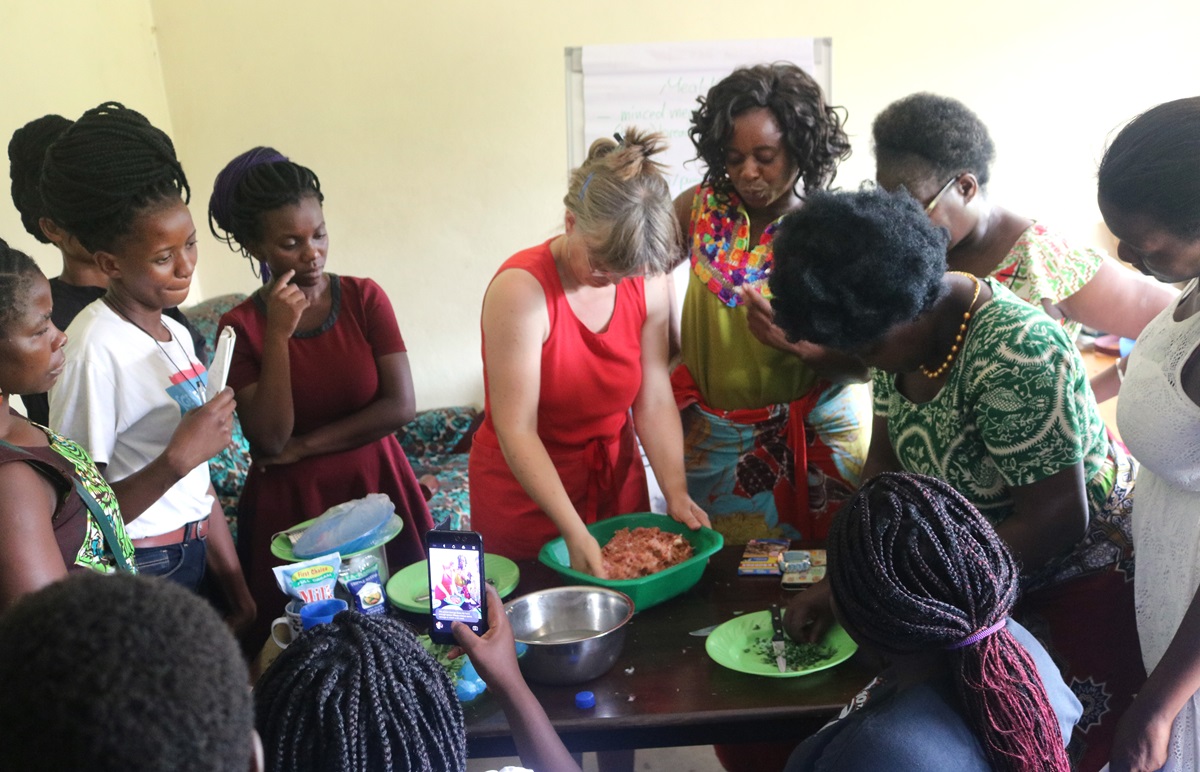In Malawi, nearly 70 percent of the 17 million people live on less than $1.90 a day. Poverty is concentrated in rural areas, where 95 percent of the poor live. Gender inequality is high.
Challenged by the reality of those statistics from the United Nations Development Program, the Malawi Conference Youth Fellowship formed a Young Women’s Committee. In December, the new committee collaborated with the conference women’s organization to train some of the affected young women. The event was funded by the Evangelical Methodist Church World Mission of Germany.
Through the training, the young women shared life experiences and learned new business and cooking skills. Sessions focused on education, gender-based violence, dating and courtship, and spirituality.
Opening the two-day event was a devotion by the Rev. Ephraim Kambona, district superintendent. He focused on Exodus 33:12-19 and John 8:36: finding peace and freedom through God.
As the women introduced themselves, many shared their involvement in income-generating activities. Most young mothers have part-time jobs, selling used clothes and plaiting hair. Some are stay-at-home moms, while others are students.
Jordan Nkhata, who facilitated the classes on education, reminded participants that school improves critical thinking and gaining an education is not just about getting a job. It is also about learning about their rights and saying “no” to violence when it is being done to them.
Young women were advised to go back to school to achieve financial independence. They were told not to fear responsibility and reminded that they have the ability to influence others.
“The training has encouraged me that as a young woman, I am endowed with great power and gifts and that I can be very influential in my community,” said participant Miracle Osman. “So I should never be scared of becoming autonomous because the power for change lies within me.”
During the gender-based violence discussions, the young women discussed victim-support resources. Asked why they don’t seek help from family and friends, the women said they often blame themselves and accept the abuse as punishment from men.
Participants were counseled to respond to violence calmly but boldly and to pray for love and peace within themselves so that they might also have an impact on the world.
The women also talked about ways to improve existing businesses and start new businesses. They learned about idea generation and screening, product development and market testing. Cooking lessons included preparing meatballs and vegetable soup, new skills that could be used in their homes and businesses.
“I am very thankful for this training for it is an eye-opener to me. I have learned a lot,” said Catherine Nkhwari. “I will go home a motivated person knowing that I can make a difference on my life. I will be able to come up with a business, take care of myself and use what I have to do well in this life.”
Participants admitted that they encounter many challenges when seeking life partners, sometimes resulting in unplanned pregnancies, early marriages and abusive relationships. They were encouraged to approach possible relationships by asking themselves: Is the man in a relationship with God? Does he love God? Is he prayerful? Does he give to God’s work?
Highlighting women’s spirituality, Blessings Nkhata started by asking each participant personal questions and telling them to find Scriptures that corresponded to their answers. Using Jacob, son of Isaac and grandson of Abraham, as an example, Nkhata noted that even with his faults, Jacob possessed three things: the desire to meet God, the decision not to leave God until God blessed him and determination.
“God always works with people who are longing to meet him,” Nkhata said. “The decisions we make in Christ can be hard and challenging. They might even be bitter ones, but that’s Christianity. Let us be … willing to make decisions and stand on them, no matter how hard it may get.”
When Jacob wrestled with the angel, Nkhata continued, “Jacob couldn’t let go of the angel until the angel was tired because Jacob was determined to get his blessings. His name was changed from ‘Jacob’ to ‘Israel,’ not based on his past, but on the decision he made.
“Our past has is gone; therefore, we have a chance to start afresh and make new and better decisions.”
The training helped the women reflect on their daily lives and to realize that past mistakes can guide to better decisions in the future.
“God gave us the same abilities and gifts as men,” said conference women’s coordinator Motera Mhone. “Therefore, we have a responsibility to take up our roles.”
Participant Mercy Kambona said the training would be life changing.
“This is love and this is what I needed. It has really made a difference in my life. I am going home with courage that I, too, can do better,” she said.
Nkhoma is a communicator for the Malawi Provisional Conference.
News media contact: Vicki Brown at (615) 742-5470 or newsdesk@umcom.org. To read more United Methodist News, subscribe to the free Daily or Weekly Digests.
Like what you're reading? Support the ministry of UM News! Your support ensures the latest denominational news, dynamic stories and informative articles will continue to connect our global community. Make a tax-deductible donation at ResourceUMC.org/GiveUMCom.




